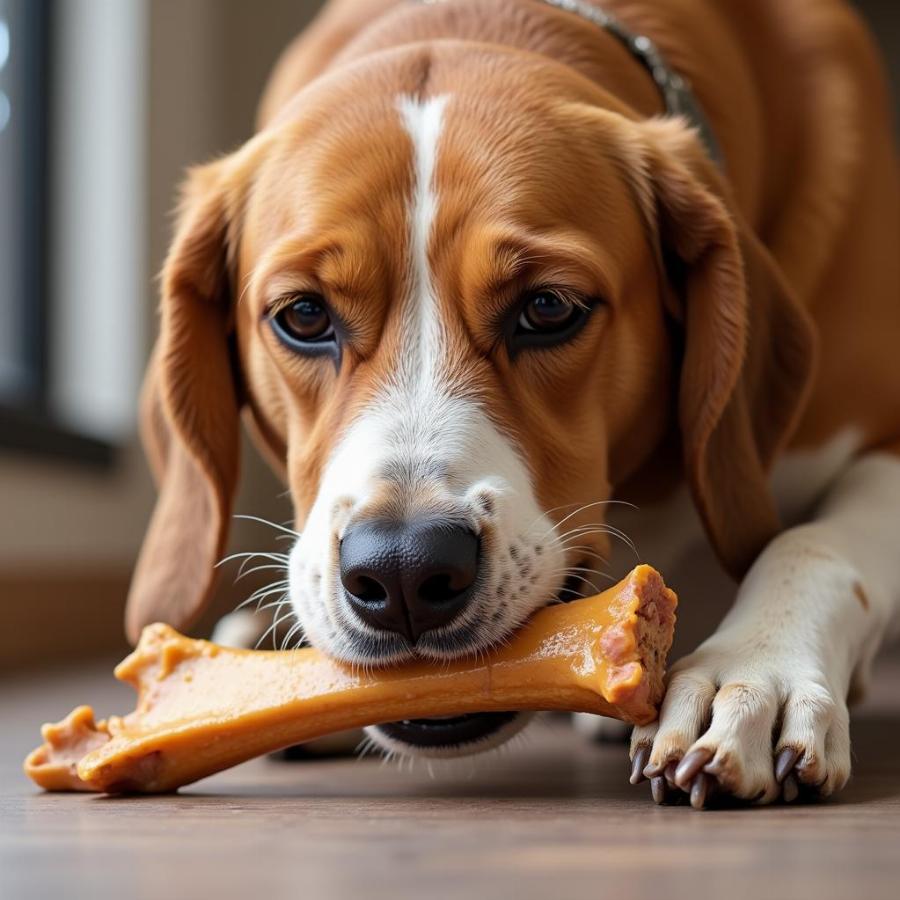We all know dogs love a good bone, but not all bones are created equal. While it’s second nature to picture a dog happily gnawing on a bone, the truth is, some bones can pose serious risks to our furry friends. This is particularly true when it comes to chicken bones. So, are chicken bones safe for dogs? The short answer is a resounding no.
Chicken bones, especially cooked ones, are extremely dangerous for dogs. Unlike larger, denser bones that are safer for chewing, chicken bones are brittle and splinter easily. These sharp splinters can cause a host of problems, ranging from minor mouth injuries to life-threatening internal damage. Let’s explore the dangers in more detail.
The Hidden Dangers of Chicken Bones for Dogs
While a juicy chicken dinner might be tempting to share with your furry pal, it’s crucial to understand the risks involved in giving them the bones:
- Splintering: Cooked chicken bones are notorious for splintering into sharp shards. These shards can cause injuries to your dog’s mouth, throat, esophagus, stomach, and intestines.
- Choking Hazard: Chicken bones, particularly smaller ones, present a choking hazard. They can easily get lodged in your dog’s throat, obstructing their airway.
- Internal Damage: If swallowed, sharp bone fragments can puncture or tear the lining of your dog’s digestive tract, leading to internal bleeding, infections, and potentially fatal complications.
- Constipation: Large pieces of bone that don’t splinter can cause blockages in the digestive system, leading to constipation, vomiting, and requiring veterinary intervention.
 Dog Chewing on a Chicken Bone
Dog Chewing on a Chicken Bone
What to Do if Your Dog Eats a Chicken Bone
Accidents happen, and if your dog manages to snatch a chicken bone, it’s essential to stay calm and monitor them closely for any signs of distress. Here’s what to do:
- Assess the Situation: Determine how much bone your dog ingested and if they are showing any immediate signs of choking or discomfort.
- Contact Your Vet: Regardless of the amount consumed, it’s crucial to contact your veterinarian immediately. They can provide guidance based on the specific situation.
- Monitor for Symptoms: Keep a close eye on your dog for any signs of:
- Choking or gagging
- Vomiting
- Diarrhea (possibly bloody)
- Loss of appetite
- Lethargy
- Abdominal pain
- Constipation
Dr. Emily Parker, a veterinarian specializing in canine nutrition, advises, “It’s always better to err on the side of caution when it comes to chicken bones. Even if your dog has eaten them before without any issues, the risk is simply not worth taking.”
Safe Alternatives to Chicken Bones
Knowing the dangers of chicken bones doesn’t mean your dog has to miss out on the joy of chewing. There are plenty of safe and enjoyable alternatives:
- Dental Chews: Specifically designed for dogs, these come in various shapes, sizes, and flavors to promote dental health and satisfy chewing instincts.
- Hard Rubber Toys: Durable rubber toys provide a satisfying chewing experience and are less likely to splinter or break.
- Frozen Treats: Frozen carrots, Kongs filled with peanut butter, or ice cubes made with low-sodium broth offer a refreshing and stimulating chewing experience.
Conclusion
While it might be tempting to toss your dog a chicken bone, it’s crucial to prioritize their safety. Chicken bones pose significant choking and internal injury risks, and the potential consequences far outweigh any perceived benefits. Opt for safe alternatives that satisfy their chewing instincts without compromising their well-being. Remember, a happy dog is a healthy one!
FAQ
Can dogs eat raw chicken bones?
While raw bones are less likely to splinter than cooked ones, they still pose a risk. Raw chicken can also carry bacteria like Salmonella, which can be harmful to both dogs and humans.
What kind of bones are safe for dogs?
Large, raw bones from beef or bison are generally considered safer for dogs, but it’s crucial to supervise their chewing and choose bones that are appropriately sized to prevent choking. Always consult your veterinarian for personalized advice.
How can I prevent my dog from getting into chicken bones?
Be mindful of discarding chicken bones securely, keeping them out of your dog’s reach in the trash. Educate family members, especially children, about the importance of not feeding chicken bones to dogs.
My dog ate a chicken bone a week ago, and now they’re sick. Could it be related?
It’s possible. Even if some time has passed, a bone fragment could still be causing issues. Contact your veterinarian immediately if your dog exhibits any signs of illness after consuming chicken bones.
What are some signs that my dog has a bone stuck in their intestines?
Signs of an intestinal obstruction can include vomiting, diarrhea, lethargy, loss of appetite, and abdominal pain. If you suspect your dog has an obstruction, seek immediate veterinary attention.
Looking for More Dog Care Advice?
Check out these other helpful articles on Beaut Dogs:
Beaut Dogs is your one-stop resource for all things dog-related. We provide reliable and in-depth information about the wonderful world of dogs. From breed guides to care tips, we’re here to help you give your canine companion the best possible life. Need support? Reach out to us at [email protected] for detailed and accurate answers. Let Beaut Dogs be your guide in your journey as a loving dog owner!